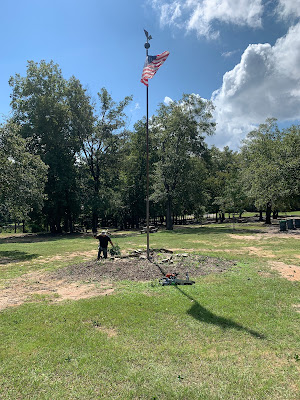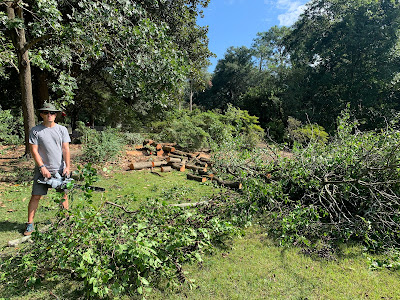Our September work has concluded and has brought great achievement and great promise! The Ivy League has shifted gears a bit this month and are taking on the arduous and hopefully not too controversial task of dealing with landscaped invasive trees in the more visible sections of the park.
Fall is an excellent time to do tree removal for several reasons: it's getting cooler!, birds are no longer nesting and cannot be disturbed by tree removal, and applying herbicide to the cut stems of trees is much more effective due to downward fluid transport to roots as they prepare for dormancy.
With several months until tree delivery (I've ordered over 100 native trees from Georgia Forestry Commission) and tree planting season, our crew is setting its sights on removing problematic trees. These trees are non-native and are reproducing prolifically, and we intend to replace them with native trees that improve wildlife habitat. We're engaged in a sort of two-pronged approach at the moment. As we restore native habitat in the woods, we see it necessary to remove the source populations of invasive plants that were planted in the park by well-intentioned but misinformed park lovers years ago.
So with this context laid out, let us recap the September 9th workday. Five folks stopped in to partake in the grunt labor that defines this part of restoration. To begin the day, we targeted the most ironic and hypocritical feature of Pendleton King Park, an American flag surrounded by aggressive Chinese Holly trees. These four trees comprised a bit more biomass that we figured and were absolutely LOADED with fruits. Removal of these guys made for some really provocative photo ops that symbolize what the native plant movement is all about.
Dragging these bad boys to the dumpster was a difficult task, and I really appreciate everyone's heroic efforts in doing so.
For those readers and park enthusiasts who are somewhat disturbed by our efforts that appear to be "degreening" the park, I am including this picture and a short narrative to drive the point home.
Just take a second to look at the hundreds and thousands of berries that these hollies were loaded with. This picture sums up the issue at hand.
What we are doing is ridding the park of the "forbidden fruit." Yes birds like to eat these berries and nest in the branches, but most of these Asiatic species lack the nutrition and wildlife value that our birds have grown accustomed to. Imagine if every time you ate some preservative-drenched piece of junk food, it replaced a fresh produce item in the grocery store. Eventually the whole store would be full of garbage. Well, that's what's happening in our woods and especially so at Pendleton King Park.
Blaming these birds for eating and dispersing exotic plant fruits is the equivalent of blaming some road warrior for caving into the Wendy's four for four deal. When you're tired, hungry, and in an unfamiliar place, you're gonna grab what's available-despite the consequences. And that's exactly the case with the thousands of migratory birds that move through the park each year.
So we really hold the blame in this breakdown, for introducing species that lead to the deterioration of habitat and outcompete critical native species. We've tipped the balance for purely aesthetic reasons in favoring non-natives over natives, despite the fact that many exotic plants have a native alternative (these Chinese Hollies should be American Hollies!).
So enough of my rant. Here's a photo of Zach post Chinese Holly removal that typifies this month's work nicely:
We had a little time left after this project, so we switched gears to taking down two Bradford Pears in the shade of a majestic Longleaf Pine. Bradford Pear is public enemy #1. States like Ohio and South Carolina will soon ban their sale and are offering bounties in which Bradfords are removed and native trees are offered in return. These are really worthless trees from an ecological standpoint and are EXTREMELY aggressive in their takeover. Anyone skeptical of this claim should drive down Doug Bernard Parkway when they flower in March- you will be floored.
So despite the debris dumpster being full, we took em down and have opened up more space to plant native trees.
 |
| Yuck-the forbidden fruit |
Now fast-forward to
September 16th, our other park workday. Diane and Anthony joined me to take down two more yucky Bradford Pears along the Azalea Trail (very carefully avoiding causing any damage to the many planted azaleas in the vicinity).
One big tree was kind of a doozy, and it took the majority of our workday to parcel it up and move it to a location for pickup.
 |
| Before |
 |
| During |
 |
After
|
I'm super psyched about the space that we have made to plant some beneficial trees here along the Azalea Trail. I'm also excited about the removal of devilish progeny that we are preventing from entering the food and dispersal chain.
I'm signing off with this victorious photo of Anthony. I miss seeing all of you all! Please come out and join in this important effort on
Saturday, October 14th. Note that this is actually the second Saturday of the month-another deviation to accommodate my being out of town on the 7th. Hope to see y'all then to enjoy a nice fall day of good, hard work! And thanks for sticking with my longwindedness- I feel the need to justify these efforts in particular. Adios!
















.png)

No comments:
Post a Comment